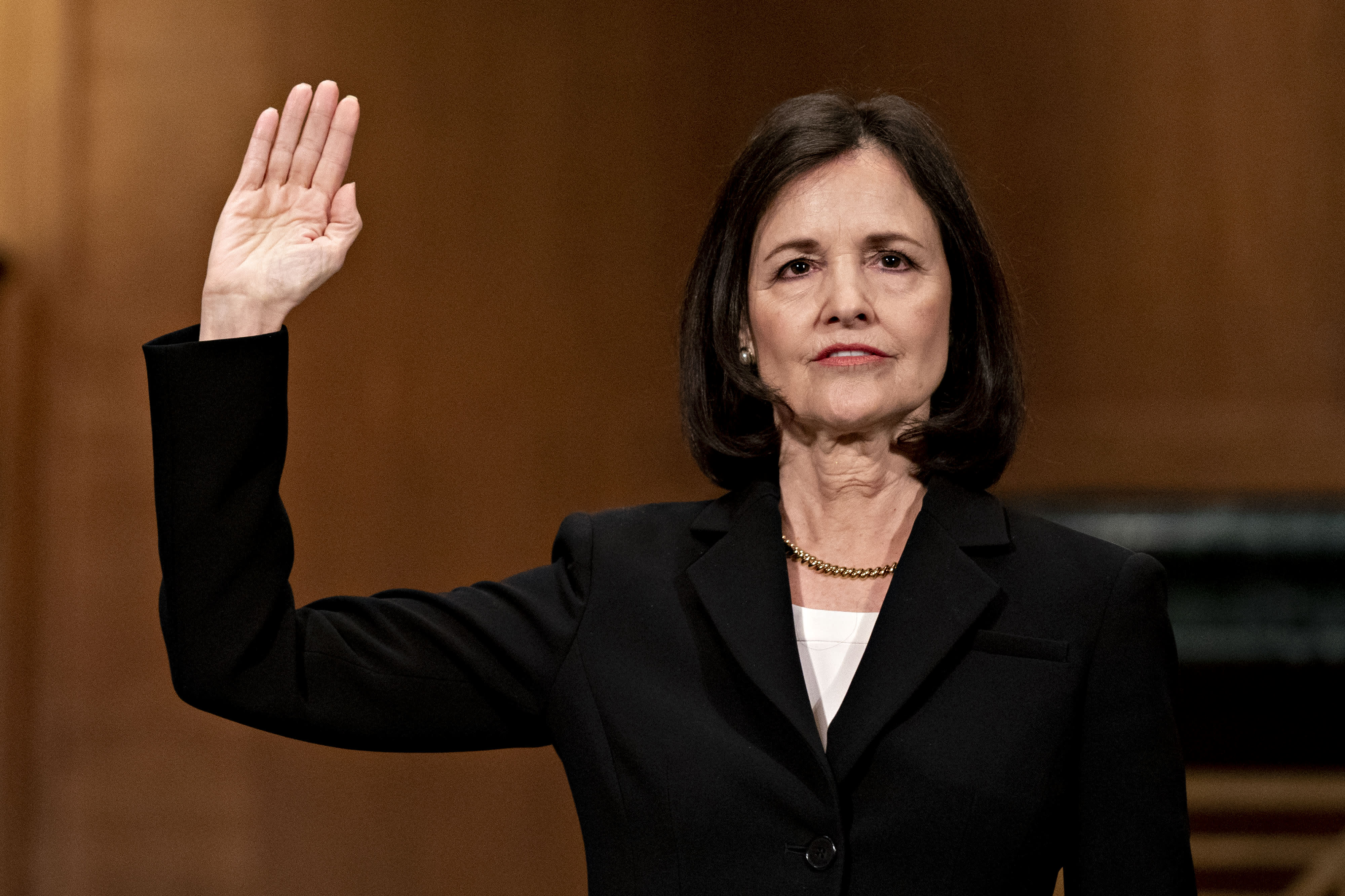
Federal Reserve nominee Judy Shelton faced a blistering confirmation hearing Thursday, as senators grilled her over her views on central bank independence, the gold standard and whether the money that people deposit at banks should be insured.
Facing a barrage of criticism over multiple statements she has made over the years, Shelton defended herself as an “outside the box” thinker who would bring her own experience and ideas to the Fed.
“I would look very much forward to working with my colleagues at the Federal Reserve,” she said in response to a question from Republican Sen. Richard Shelby of Alabama on whether she is “an outlier” and “not mainstream” in her thinking. “I have great respect for their capabilities and for their judgment. I think I would bring my own perspective. But I think the intellectual diversity strengthens the discussion and would be welcome.”
Judy Shelton, U.S. President Donald Trump’s nominee for governor of the Federal Reserve, swears in to a Senate Banking Committee confirmation hearing in Washington, D.C., on Thursday, Feb. 13, 2020.
Andrew Harrer | Bloomberg | Getty Images
But banking committee members repeatedly accused her of holding views that were radical, then disavowing them during her hearing.
Sen. Doug Jones, D-Ala., asserted that Shelton had a “confirmation conversion. I think you said it best that what we will get is the authentic Judy Shelton, and that is what bothers me tremendously.”
Ohio’s Sherrod Brown, the leading Democrat on the panel, was even more direct: “The bottom line is, Ms. Shelton has too many alarming ideas and has flipped-flopped on too many important issues to be confirmed for this job.”
Shelton’s confirmation is not assured; if she loses even two Republican votes it would kill the nomination in committee.
Her testimony was “delivered in a thoughtful and steady manner, but it appears to have not been enough to win over skeptical Republican Senators,” Ed Mills, Washington policy analyst at Raymond James, said in a note. Mills also speculated that Shelton might have a rougher road given the speculation that she might be considered for the Fed chairmanship after Jerome Powell’s term ends.
Thursday afternoon, The Hill reported that an unnamed Republican senator believed Trump would be pulling her nomination. Still, Reuters reported that the White House expected Shelton to be confirmed by the Senate, citing a White House spokesman.
Intense questioning
Shelton’s writings over the years offered a variety of views: She has advocated for a type of gold standard, though different than the traditional one the U.S. abandoned in 1971. One writing said FDIC insurance for bank deposits could encourage banks to take more risks, while she also has questioned whether the Fed should be wholly independent or work with Congress and the White House.
But Shelton said she sees independence as a “vital aspect” of the Fed’s role and said her cited remarks were merely quoting legislation. On the gold standard, she said she “would not advocate going back to a prior historical monetary arrangement.” She also rejected the notion that she doesn’t favor deposit insurance.
“I totally support federal deposit insurance. We’ve had it since 1933. I think it’s essential to reassuring depositors that they can safely put their money into American banks,” Shelton said. She added that she wasn’t even certain where the idea came from that she opposed the insurance.
Sen. Chris Van Hollen, D-Md., challenged Shelton on a statement in which she said the government deficits run up by former President Barack Obama after the financial crisis were “unconscionable.” Van Hollen repeatedly asked Shelton whether she felt the same way about the swelling debts and deficits under President Donald Trump, who nominated Shelton to the governor’s post.
“The problem is, you’ve got a lot of writings, strong writings of a very political nature, and now your responses are totally inconsistent with the positions you’ve taken in the past. The only thing that has changed is who’s in the White House,” Van Hollen said.
Shelton also faced some push-back on the Republican side, with Sen. Patrick Toomey of Pennsylvania disagreeing with a notion Shelton raised that the U.S. should consider following its global peers when they devalue their currency.
Support from Republicans
But she also found support from the GOP leadership.
“You have been very sold in explaining your writings and your positions,” said committee Chairman Mike Crapo of Idaho. “This is an orchestrated, calculated effort. I think you have done very well today.”
Many of the questions were of a political nature.
Several senators asked whether she thought it was appropriate for Trump to be so open in his criticism of Powell and Federal Open Market Committee members as a whole for not keeping interest rates low enough.
Christopher Waller, U.S. President Donald Trump’s nominee for governor of the Federal Reserve, listens during a Senate Banking Committee confirmation hearing in Washington, D.C., on Thursday, Feb. 13, 2020.
Andrew Harrer | Bloomberg | Getty Images
“I think what we’ve seen historically is some Fed chairmen have felt they were being pressured behind the scenes,” Shelton said. “In some ways, it’s refreshing that that’s out in the open.”
The hearing actually was for two Trump nominees — economist Christopher Waller of Minnesota also was in the room, but he faced comparatively few questions and nothing antagonistic. Crapo introduced a letter signed by more than 100 economists advocating Waller’s confirmation. For Shelton, he produced only a Wall Street Journal editorial titled “The war on Judy Shelton.”
Brown pointed to opposition from the American Enterprise Institute. Toward the end of the hearing, he asked Waller, who heads the St. Louis Fed’s research department, whether he’d hire Shelton for his team.
“Senator, that’s your decision, not mine,” Waller replied, adding that his economists publish for academic journals while Shelton’s writings are more mainstream media.



